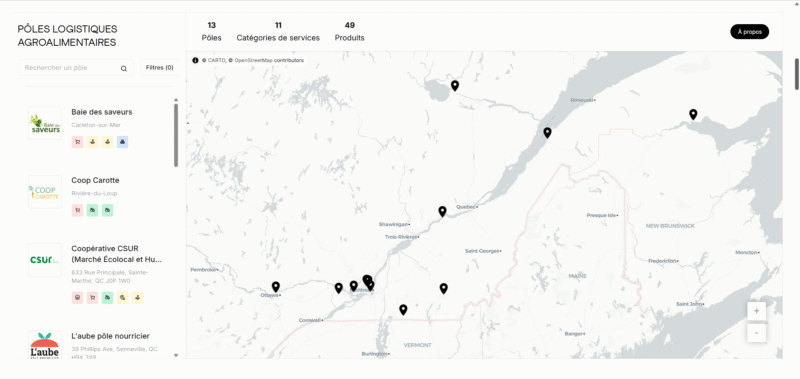Mapping Quebec’s Food Logistics Hubs
Part of Open Food Network (OFN) Canada’s mission is to grow an ecosystem of open technology that protects data sovereignty, fosters collaboration, and strengthens local food systems. From February to October 2025, we worked with a network of partners to create a map of Quebec-based short food supply chain initiatives. Led by CoopCircuits—our French counterparts in the Open Food Network federation—and supported by EU Next Generation Internet (NGI) Sargasso funding, the initiative focused on key goals that are critical to short supply chains: visibility, interoperability, and data accuracy.
The Challenge Behind the Map
Grounded in grassroots initiatives, Quebec’s short supply chain sector is defined by its diversity. From co-ops to startups to nonprofits, this diversity is reflected both in the sector’s varied business and financial models and in the wide array of digital tools used across the region—each built with its own design and data structure.
This fragmentation in the sector creates three key challenges:
- Visibility and Discovery: It’s challenging to develop a clear, comprehensive picture of the sector—whether of product volumes, distribution patterns, or just the range of different initiatives active throughout the province.
- Interoperability: Without compatible systems, regional actors struggle to coordinate logistics, which remain prohibitively complex and costly for small enterprises.
- Data Accuracy: Because organizations use disconnected systems—from spreadsheets to custom databases and e-commerce platforms—data on production and distribution is often incomplete or inconsistent, limiting evidence-based planning and coordination.
What We Built
The food logistics hub map was designed to address these challenges and support more cooperative, efficient short supply chains across Quebec. Developed with and for the Quebec Council of Cooperation and Mutuality (CQCM)—a democratic body founded in 1940 to strengthen cooperative and mutualist networks—the map is a fully open-source digital tool.
Visibility: The map highlights the diversity of initiatives and products moving through short supply chains, increasing visibility among customers, funders, and partner enterprises.
Shared Insight: The map builds a federated standardized data set that gives a clearer view of the sector and helps advance short supply chain distribution. Through this shared resource, CQCM can help its members pool resources, exchange ideas, and strengthen the cooperative ecosystem as a whole.
Improved Data Quality: To overcome inaccuracies caused by data siloing, we began by connecting with the tools that hubs and producers already use—Open Food Network (OFN), Locavora, and CSV files. This approach harmonized and validated data at its source, ensuring accuracy and usability across systems.
Importantly, the map was designed to empower food hubs and producers to share data and coordinate supply chains without giving up control of how their data is used. A key outcome was the creation of a Data Permissioning Module (DPM)—a foundational component for interoperability across digital tools. The DPM allows users to decide what data to share, with whom, and for what purpose.
Watch the 6-minute video demonstration
What We Are Building
Building on this foundation, we’re expanding the work with CQCM and other regional networks worldwide to better understand local needs and co-develop the next generation of tools. Through a series of community needs assessments, we’ll work with food hubs, cooperatives, and producers to identify priority features that make collaboration easier.
A key focus is developing integration tools that connect with everyday systems, like Square POS devices and e-commerce platforms such as WooCommerce and Shopify. These integrations will let regional networks securely share data across platforms they already use, improving coordination and real-time insight.
Our goal is to equip communities with tools for shared understanding and informed decision-making, enabling collaboration at scale across diverse digital ecosystems. By linking open-source infrastructure with the systems that power local economies, we can make regional cooperation easier, smarter, and more sustainable.
Strength in Collaboration
Sharing open-source digital tools globally is central to the Open Food Network’s mission. This project demonstrates how collective innovation strengthens local food systems while advancing the global digital commons.
- May 2024: OFN Australia launched Discover Regenerative, an open-source tool promoting regenerative agriculture products.
- September 2024: OFN Canada adapted the same framework to create waterlooregionfood.ca, a local food directory.
- October 2025: CoopCircuits and partners built on that foundation to create Quebec’s Food Logistics Hubs Map.
- Winter 2026: OFN Canada will upgrade the Waterloo food directory with new functionality from the Food Logistics Hubs Map.
Each new version builds on the last, adding features and refinements to the shared foundation maintained by the OFN community. Because these tools are open source, future contributors—both within and beyond OFN—can adapt, improve, and extend them, multiplying the benefits for communities everywhere.
Project Partners
CoopCircuits (France) | A founding member of the global Open Food Network, CoopCircuits led coordination across partners and gathered user feedback from the CQCM network to ensure the tool met real needs on the ground.
Startin’Blox (France) | Startin’Blox—a cooperative that builds web applications for data spaces—contributed key technical development. Their modular, standards-based technology helped make the tool interoperable while keeping data ownership in users’ hands.
Food Data Collaboration (UK) | The Food Data Collaboration unites UK organizations working to create open data infrastructure for a fairer, more transparent food system. Their expertise in interoperability and governance helped align this project with broader global efforts.
Data Food Consortium (France) | The Data Food Consortium provided the open data standard that underpins this project. Applying the DFC model in new contexts helped identify opportunities to strengthen and extend the standard for future use.
CoopCircuits received financial support from NGI Sargasso, a European Commission program supporting digital innovation between Europe and North America under the Next Generation Internet initiative.

Open Food Network is a free and open source software platform. Our content is licensed with CC BY-SA 3.0 and our code with AGPL 3.
We take good care of your data. See our cookies policy

